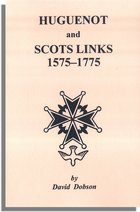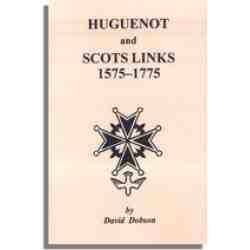Are you on the trail of a Huguenot (French Protestant) immigrant ancestor? Has the trail grown cold after you pursued every possible lead? If so, have you ever thought that your family might have settled in Scotland for a period of time prior to arriving in the New World? If not, consider the following.
Until its revocation in 1685, the Edict of Nantes had granted French Protestants a degree of religious freedom. After Louis XIV rescinded the Edict, Huguenots, fearing reprisals, fled to whichever of the Protestant countries would receive them. While most Huguenots took their skills and remaining capital to The Netherlands, Germany, Scandinavia, England, and America, some of them or their descendants made their way to Scotland, which officially had become a Protestant country in 1560. While a small number of refugees and emigrants from France settled in Scotland in the immediate aftermath of the revocation, the main influx occurred in the last quarter of the 17th century. Most of these emigrants (craftsmen, artisans, and merchants) settled in the Canongate, then a separate burgh but now a part of Edinburgh. The second largest occupational group of French Protestants joined Scottish regiments and fought against the armies of France or its Jacobite allies in Scotland and Ireland.
Researchers will discover the identities of many of these Huguenot emigres or their descendants in a groundbreaking new work from David Dobson entitled, Huguenot and Scots Links, 1575-1775. Working from baptismal registers, burgess rolls, tax lists, marriage registers, and other primary sources, Mr. Dobson has unearthed information concerning over 1,000 Scottish Huguenots or their descendants. For each individual, the compiler provides the name, a locale, a date, usually an occupation, and something about the person (e.g., “admitted as a burgess,” or “apprenticed to James Smart a merchant in Edinburgh,” or “married Beatrix Cowan in Canongate”). While this book can scarcely claim to list every person of Huguenot descent who made Scotland his or her new home, in referring to over 2,000 subjects and their family members or associates, it holds out newfound hope to bewildered researchers.


